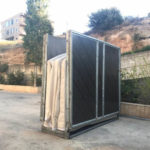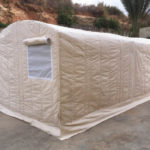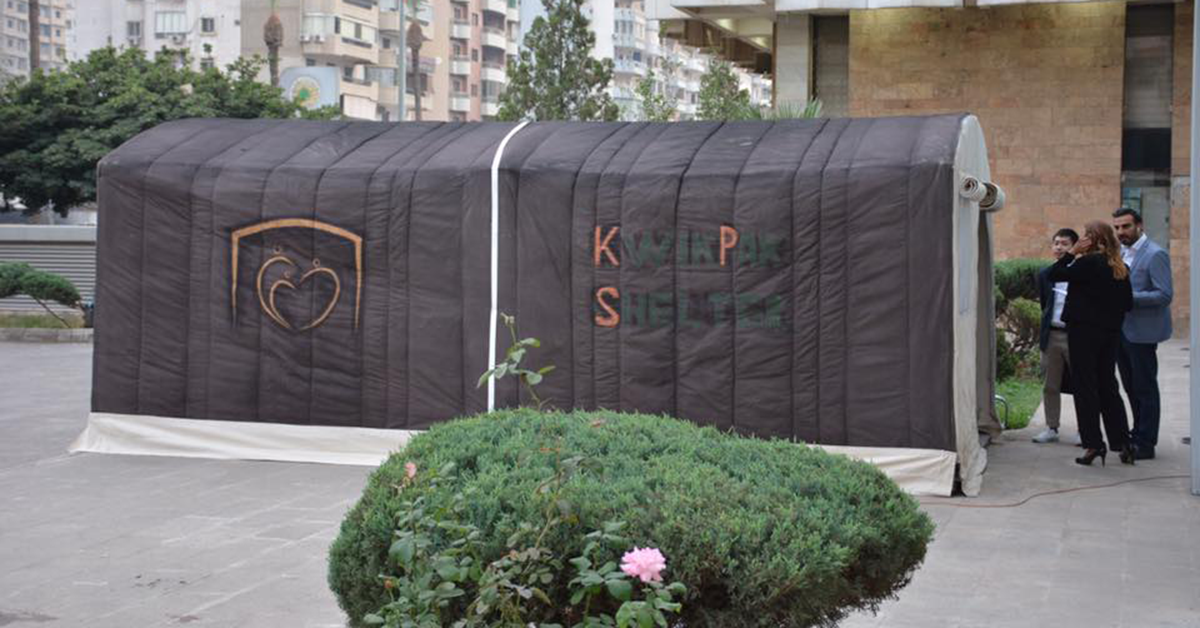
Berytech caught up with architect Fatima Khaled to discuss her journey with Kwikpak Shelter as she has recently joined Berytech’s Impact Rise program with her two partners Sima el Sheikh and Nadin el Hayek.
It started as a Master’s project for three young women and quickly turned into a startup with big potential. Kwikpak Shelter is a ready-to-deploy emergency housing unit for refugees, vulnerable people forced to migrate, and communities caught in natural disaster zones who are no longer able to cope or meet their basic shelter needs for survival.
The shelter concept relies on a foldable and logistics-friendly system, for quick mobilization and rapid emergency response; it also helps in lowering the costs of transportation and deployment.
Building the First Prototype
Fatima and her team extensively researched shelter types at local refugee camps for their master’s final project. What they found were inadequate, inhumane makeshift tents that do not respect the minimum necessary conditions for daily life; tents made from wood and nylon that do little to protect their inhabitants from the weather conditions. Improvised tents also harm the environment; a lot of agriculture land is covered with cement to build the tents on, while using wood structures makes them neither sustainable nor reusable at an eventual higher cost.
The team discovered a need for a shelter that could be quickly and easily be packed and unpacked. They worked on a prototype that is deployable in less than 10 minutes, which could be packaged in less than 1 meter cubed and easily transported. Their solution could be used for direct response and quick mobilization, easily packed and reused, and would last up to 5 years. Watch the first video of the prototype.
Turning the idea into a startup
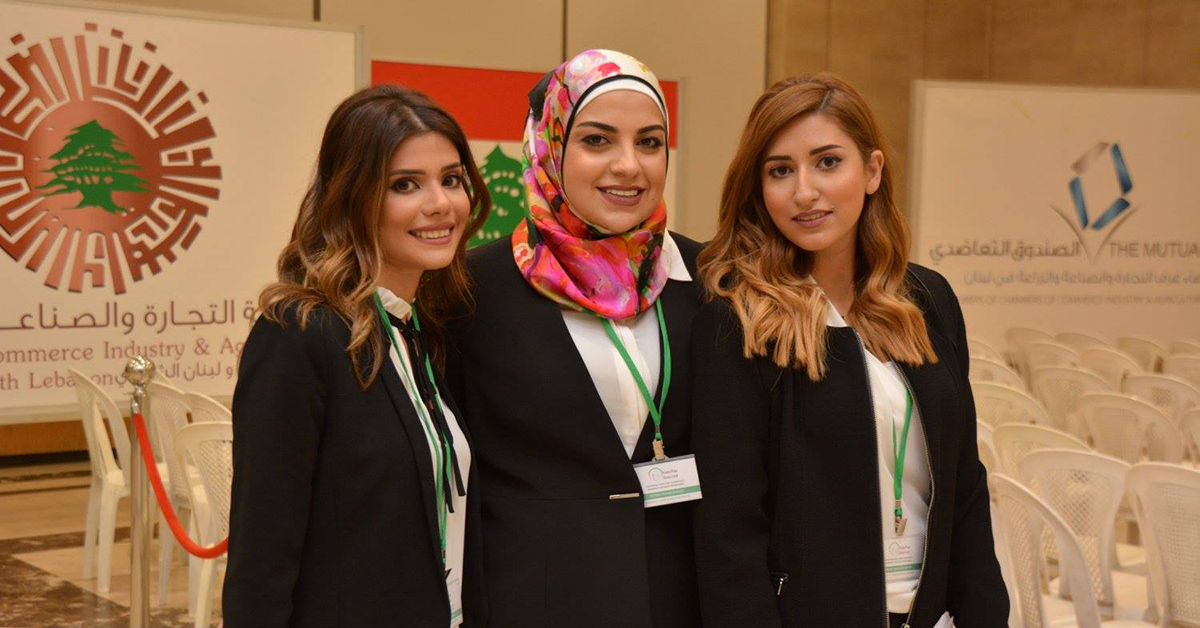
The team then joined the Startup Seed Program of the Tripoli Entrepreneurs Club and worked on developing their idea from a business perspective. Kwikpak won the first prize in the Tripoli Startup Forum. In 2018, the team registered their company in the Chamber of Commerce and invited municipalities and NGOs for an official launch. Soon after, Kwikpak won the idea track of the MIT ‘Innovate for Refugees’ global competition that was held in Amman in 2019.
Challenges in Prototyping
“Our first prototype was made of steel and had some difficulties to open and close. It was made of several parts, so we modified it to be a stable, completely modular unit that can be folded. Throughout that time, with the advice of experts in business and industrial development, we explored several prototypes to reach a final commercial product. One of our advisors saw the potential in the idea and eventually became our business partner,” details Fatima. “Our mentor in industrial development pushed us to make the design more modular, to reduce time and space when producing it in large quantities while minimizing production cost. This is the prototype that won us the MIT idea award.”
“Soon after, an angel investor worked with us to create an improved third prototype. We had set out to manufacture it in Saudi Arabia where his construction company is located. It was a decision laden with strains. We faced difficulties in traveling there as single young women, and then we faced complications in shipping the finished prototype back here. Our attempts were completely deterred as the COVID-19 imposed lockdowns, so we moved on to creating our fourth porotype in Lebanon.”
At this point, Fatima decided to take the matter into her own hands. She worked closely with a small manufacturer to produce the updated fourth version. It gave her tight control over production and also simplified confidentiality issues. She updated the opening and closing mechanism, which is essential in the success of the product, and reduced the size of the package to reduce the overall storage size.
Going to Market
Throughout the entire journey of Kwikpak, Fatima had one client in mind: the UNHCR, which is the umbrella for all NGOs who deal with the displaced in Lebanon. The ultimate goal was to create a final optimal product to present to the UNHCR in the hopes of getting a substantial production deal. However, the team had missed a hindering barrier. The use of durable structures in refugee camps is forbidden by Lebanese law, which automatically eliminated their product from compliance. The team had to turn their sales efforts beyond the borders of the country. In the meantime, Fatima had received several one-off orders for units, which she had declined in the fear of having the Kwikpak design, which has not been patented yet, stolen and replicated, a worry validated by a similar incident that happened to one of her mentors.
As soon as the team joined Berytech’s Impact Rise program, their focus changed. The program, designed to help social startups grow and scale, provided the team with the knowledge and support of coaches and mentors to help them achieve that goal. “Mentors in the Impact Rise advised us not to rely on one potential buyer and helped us to see that our product had a wider market. We’ve elaborated our business plan to serve commercial businesses looking for storage or warehousing, clients looking for outdoor shelter solutions like food kiosks, temporary housing for construction sites, and even greenhouse solutions especially today where everyone is heading towards agriculture.”
Christine Francis has been coaching the team in their Impact Rise journey. She confirms that “with the support of their coach and mentors they show an openness to revisit their business model to ensure that they are in the right direction not only on the prototype level but on the whole spectrum of the business, clients, and markets. They can ensure their product’s efficiency and differentiation, engage the right stakeholders, and identify their market.”
“With the Impact Rise program, we are trying to focus on the minimal critical specification in order not to rely solely on one type of client. In this case, the most important element is the mechanism of the shelter: how it opens and closes, and the size of the closed package. This is the most important element we are working to finalize in the final version,” explains Fatima.
Mentor Dolly Choucair adds, “The persistence and commitment of the team will lead them to amazing results of universal values. I am impressed by how they tried to revisit and readapt their project based on the feedback of their coach and mentors. It is important that they preserve their rights and mainly those related to intellectual property to keep their uniqueness.”
Making an Impact
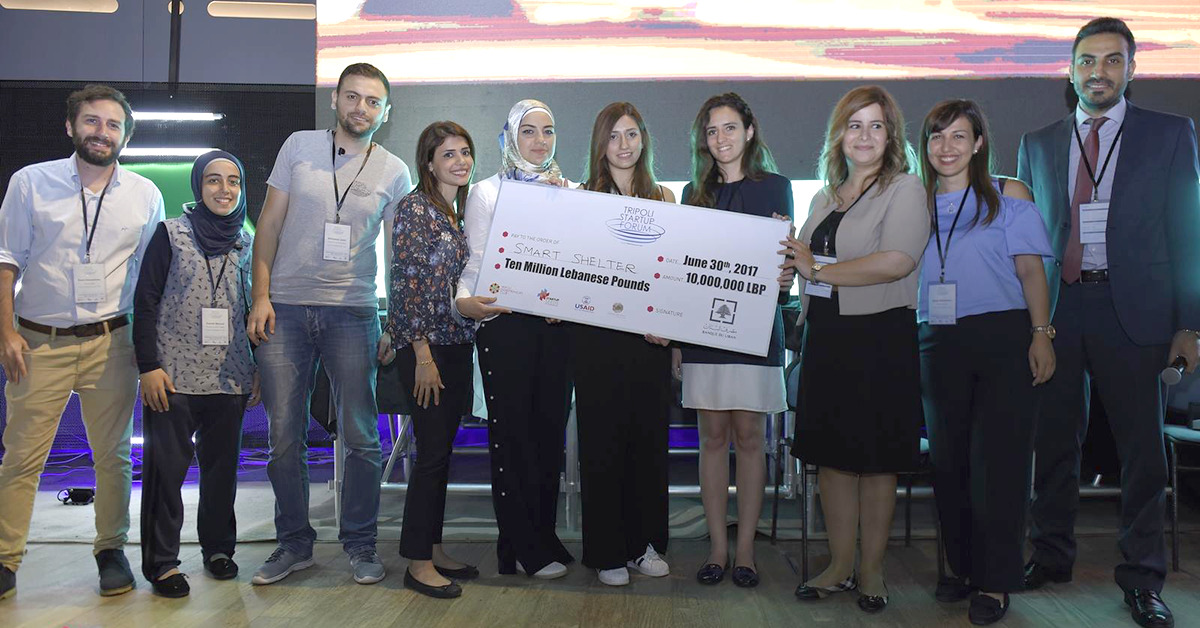
When asked about what drives her persistence in Kwikpak, Fatima replies with certainty: “I want to make a difference, even if it’s a small one, in the lives of people who are suffering.”
The team’s mentor in the program, Wael Nuweihed, believes that the solution provided by Kwikpak can be of significant value and remarkable social impact in different scenarios. It can provide temporary support for refugees, especially the most vulnerable cases, where a quick and reliable shelter is required. It is essential in crisis responses in cases of natural disasters. It could also be used to respond to medical emergencies and epidemics such as using it for COVID-19 isolation or as testing stations.
“The team is passionate, proud, and committed to their project. As with every innovative idea, there is a lot of uncertainty, qualm and hesitation about the next steps. The team’s conviction and confidence will be boosted as more concrete steps are achieved. Driven by their passion and supported by their coach and mentors, I am sure Kwikpak is poised for success at the end of their journey. This journey might require them to go back to the drawing board, challenge themselves, and take some leaps of faith,” comments Wael Nuweihed.
Becoming an entrepreneur
Fatima speaks of her rigorousness as a setback in her entrepreneurial journey so far. “I always look for perfection, but I have learned that there is no perfect plan. After reaching this point in the startup, I have understood that there is nothing perfect and that everything is a work in progress. Waiting to reach perfection is paying with your time and resources.”
“My advice for anyone who is working on a startup idea is not to wait to have a perfect solution. When you have an idea, start with it even if it is a small one. Start to actively work on it and then small acts will lead to bigger things. Persistence and patience are the way to go.”
Another important lesson Fatima shares from her entrepreneurial journey so far is about diving into new opportunities. “I have skipped on many opportunities because I felt that I was not ready for them at the time. In retrospect, taking on these challenges could have made me redirect and redefine my solution faster, bringing us closer to success.”
“What I had in mind is a shelter for refugees only and I failed to look at my product beyond that specific market. This is one of the greatest lessons I learned from Berytech in the Impact Rise Program. Understanding the different applications of your solution will automatically expand your market and allow your penetration to be faster and more sustainable.”
Impact Rise Program
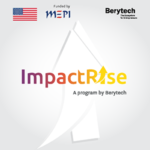 The Kwikpak Shelter team is currently enrolled in Berytech’s Impact Rise Social Innovation Program, funded by the U.S.-Middle East Partnership Initiative (MEPI). They are among 16 chosen teams who joined the startup scaling track.
The Kwikpak Shelter team is currently enrolled in Berytech’s Impact Rise Social Innovation Program, funded by the U.S.-Middle East Partnership Initiative (MEPI). They are among 16 chosen teams who joined the startup scaling track.
They were chosen based on the startup’s business and innovation potential, business model, scalability, team compatibility and expertise, as well as their ultimate social and environmental impact.
They are being coached by Wael Farah and mentored by Christine Francis, Dolly Choucair and Wael Nuweihed.


